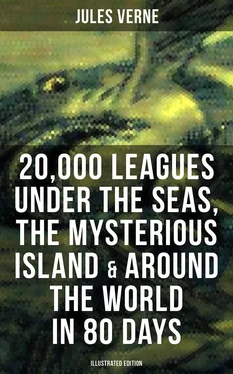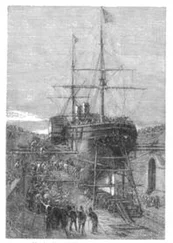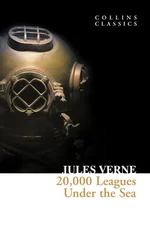I hoisted myself up to the crosstrees of the mizzen sail. Some officers were already perched on the mastheads.
At eight o’clock the mist rolled ponderously over the waves, and its huge curls were lifting little by little. The horizon grew wider and clearer all at once.
Suddenly, just as on the previous evening, Ned Land’s voice was audible.
“There’s the thing in question, astern to port!” the harpooner shouted.
Every eye looked toward the point indicated.
There, a mile and a half from the frigate, a long blackish body emerged a meter above the waves. Quivering violently, its tail was creating a considerable eddy. Never had caudal equipment thrashed the sea with such power. An immense wake of glowing whiteness marked the animal’s track, sweeping in a long curve.
Our frigate drew nearer to the cetacean. I examined it with a completely open mind. Those reports from the Shannon and the Helvetia had slightly exaggerated its dimensions, and I put its length at only 250 feet. Its girth was more difficult to judge, but all in all, the animal seemed to be wonderfully proportioned in all three dimensions.
While I was observing this phenomenal creature, two jets of steam and water sprang from its blowholes and rose to an altitude of forty meters, which settled for me its mode of breathing. From this I finally concluded that it belonged to the branch Vertebrata, class Mammalia, subclass Monodelphia, group Pisciforma, order Cetacea, family … but here I couldn’t make up my mind. The order Cetacea consists of three families, baleen whales, sperm whales, dolphins, and it’s in this last group that narwhales are placed. Each of these families is divided into several genera, each genus into species, each species into varieties. So I was still missing variety, species, genus, and family, but no doubt I would complete my classifying with the aid of Heaven and Commander Farragut.
The crew were waiting impatiently for orders from their leader. The latter, after carefully observing the animal, called for his engineer. The engineer raced over.
“Sir,” the commander said, “are you up to pressure?”
“Aye, sir,” the engineer replied.
“Fine. Stoke your furnaces and clap on full steam!”
Three cheers greeted this order. The hour of battle had sounded. A few moments later, the frigate’s two funnels vomited torrents of black smoke, and its deck quaked from the trembling of its boilers.
Driven forward by its powerful propeller, the Abraham Lincoln headed straight for the animal. Unconcerned, the latter let us come within half a cable length; then, not bothering to dive, it got up a little speed, retreated, and was content to keep its distance.
This chase dragged on for about three-quarters of an hour without the frigate gaining two fathoms on the cetacean. At this rate, it was obvious that we would never catch up with it.
Infuriated, Commander Farragut kept twisting the thick tuft of hair that flourished below his chin.
“Ned Land!” he called.
The Canadian reported at once.
“Well, Mr. Land,” the commander asked, “do you still advise putting my longboats to sea?”
“No, sir,” Ned Land replied, “because that beast won’t be caught against its will.”
“Then what should we do?”
“Stoke up more steam, sir, if you can. As for me, with your permission I’ll go perch on the bobstays under the bowsprit, and if we can get within a harpoon length, I’ll harpoon the brute.”
“Go to it, Ned,” Commander Farragut replied. “Engineer,” he called, “keep the pressure mounting!”
Ned Land made his way to his post. The furnaces were urged into greater activity; our propeller did forty-three revolutions per minute, and steam shot from the valves. Heaving the log, we verified that the Abraham Lincoln was going at the rate of 18.5 miles per hour.
But that damned animal also did a speed of 18.5.
For the next hour our frigate kept up this pace without gaining a fathom! This was humiliating for one of the fastest racers in the American navy. The crew were working up into a blind rage. Sailor after sailor heaved insults at the monster, which couldn’t be bothered with answering back. Commander Farragut was no longer content simply to twist his goatee; he chewed on it.
The engineer was summoned once again.
“You’re up to maximum pressure?” the commander asked him.
“Aye, sir,” the engineer replied.
“And your valves are charged to … ?”
“To six and a half atmospheres.”
“Charge them to ten atmospheres.”
A typical American order if I ever heard one. It would have sounded just fine during some Mississippi paddle-wheeler race, to “outstrip the competition!”
“Conseil,” I said to my gallant servant, now at my side, “you realize that we’ll probably blow ourselves skyhigh?”
“As master wishes!” Conseil replied.
All right, I admit it: I did wish to run this risk!
The valves were charged. More coal was swallowed by the furnaces. Ventilators shot torrents of air over the braziers. The Abraham Lincoln’s speed increased. Its masts trembled down to their blocks, and swirls of smoke could barely squeeze through the narrow funnels.
We heaved the log a second time.
“Well, helmsman?” Commander Farragut asked.
“19.3 miles per hour, sir.”
“Keep stoking the furnaces.”
The engineer did so. The pressure gauge marked ten atmospheres. But no doubt the cetacean itself had “warmed up,” because without the least trouble, it also did 19.3.
What a chase! No, I can’t describe the excitement that shook my very being. Ned Land stayed at his post, harpoon in hand. Several times the animal let us approach.
“We’re overhauling it!” the Canadian would shout.
Then, just as he was about to strike, the cetacean would steal off with a swiftness I could estimate at no less than thirty miles per hour. And even at our maximum speed, it took the liberty of thumbing its nose at the frigate by running a full circle around us! A howl of fury burst from every throat!
By noon we were no farther along than at eight o’clock in the morning.
Commander Farragut then decided to use more direct methods.
“Bah!” he said. “So that animal is faster than the Abraham Lincoln. All right, we’ll see if it can outrun our conical shells! Mate, man the gun in the bow!”
Our forecastle cannon was immediately loaded and leveled. The cannoneer fired a shot, but his shell passed some feet above the cetacean, which stayed half a mile off.
“Over to somebody with better aim!” the commander shouted. “And $500.00 to the man who can pierce that infernal beast!”
Calm of eye, cool of feature, an old gray-bearded gunner— I can see him to this day—approached the cannon, put it in position, and took aim for a good while. There was a mighty explosion, mingled with cheers from the crew.
The shell reached its target; it hit the animal, but not in the usual fashion—it bounced off that rounded surface and vanished into the sea two miles out.
“Oh drat!” said the old gunner in his anger. “That rascal must be covered with six-inch armor plate!”
“Curse the beast!” Commander Farragut shouted.
The hunt was on again, and Commander Farragut leaned over to me, saying:
“I’ll chase that animal till my frigate explodes!”
“Yes,” I replied, “and nobody would blame you!”
We could still hope that the animal would tire out and not be as insensitive to exhaustion as our steam engines. But no such luck. Hour after hour went by without it showing the least sign of weariness.
However, to the Abraham Lincoln’s credit, it must be said that we struggled on with tireless persistence. I estimate that we covered a distance of at least 500 kilometers during this illfated day of November 6. But night fell and wrapped the surging ocean in its shadows.
Читать дальше












